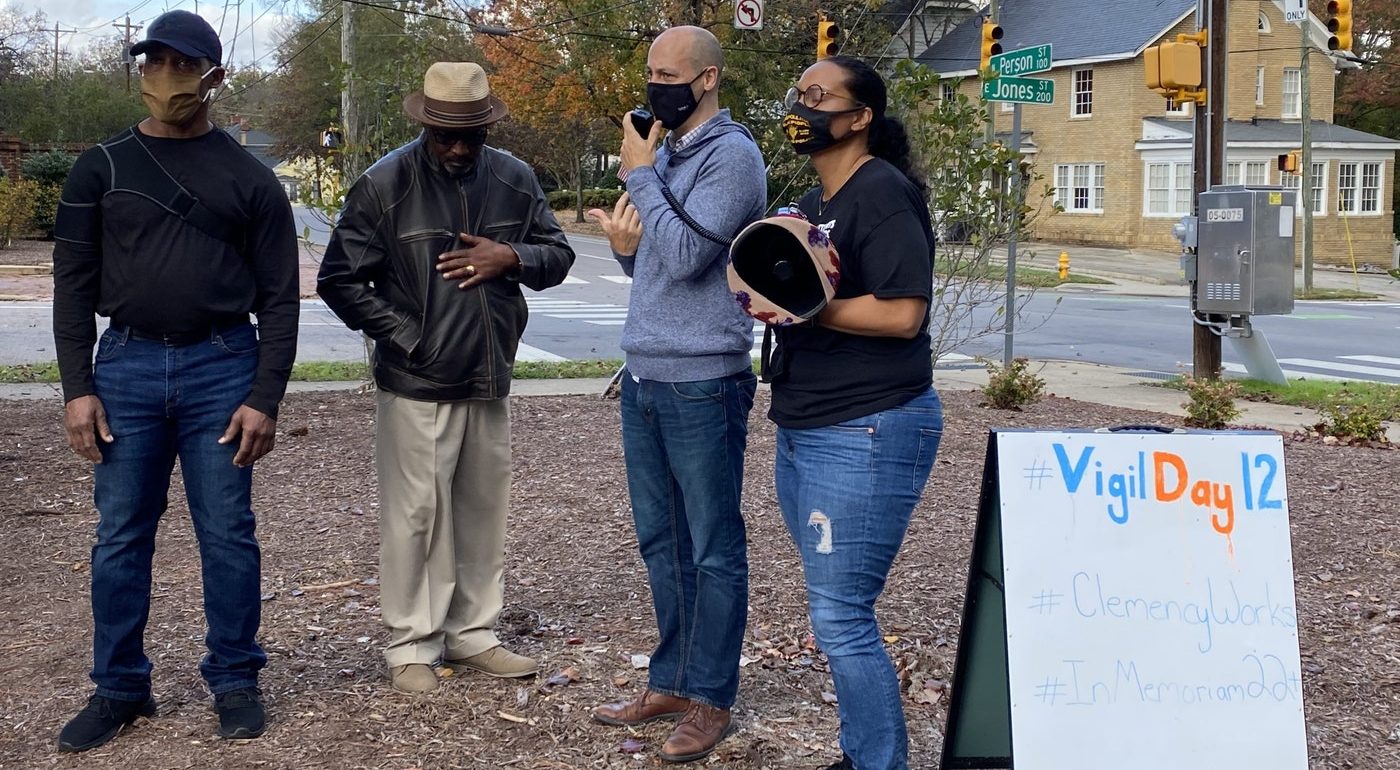
Above photo: Jamie Lau, center, speaks in a vigil calling on Gov. Roy Cooper to act on pardon and clemency requests with two of his clients released from prison after serving long sentences next to him, Calrutha Johnson and Ronnie Long. Kristie Puckett-Willliams of the ACLU of NC is on the right. Melissa Boughton.
‘We know that they see us.’
North Carolina – Demonstrators gathered outside the Executive Mansion on Sunday to demand that Gov. Roy Cooper use his powers of pardon and clemency to protect people who are incarcerated during the pandemic.
Members of Decarcerate Now NC, a coalition of organizations which say they’re working to end to mass incarceration, have been holding daily vigils outside the governor’s mansion since Election Day and plan to continue through Jan. 1, when Cooper begins his second term. That’s a total of 58 days.
“We stand vigil to bring attention to your Administration’s ongoing failure to prioritize and appropriately protect Black lives — indeed, any lives incarcerated in state prisons — from Covid-19. Nothing short of a humanitarian and public health disaster has been unfolding in many state prisons for months,” the group wrote in a letter to Cooper on Nov. 3.
Andrea “Muffin” Hudson, director of the North Carolina Community Bail Fund of Durham, has been outside the Executive Mansion from sunrise to sunset for 12 days, and plans to stay until New Year’s Day.
Hudson says that sometimes it’s just her keeping vigil, but that people from the neighborhood have stopped by and joined her, too. On a rainy day last week, she was joined by 25 supporters.
The vigil was initially set up on the corner of Jones Street and Person Street, right outside the Executive Mansion. But they were asked to move and have now set up in the parking lot across the street.
“They told us to leave so we know that they see us,” Hudson said. “But you would rather just have us to move than to engage and have a conversation around the letter that you received?”
At least 17 people in state prisons have died due to COVID-19 and more than 10% of the prison population tested has already been infected with COVID-19, the letter said. Several facilities have seen far higher rates: 32% have been infected at Lumberton Correctional and 62% at Neuse Correctional.
Without action, in the next few weeks, Cooper will become the first North Carolina governor in the last 40 years to not grant a single commutation or pardon in a term, the group says.
“He has participated in the system of mass incarceration and the system of racial inequity. But there are some changeable ways that he can provide relief to folks who are incarcerated. Their families are reminding him of that power and telling him that we support him using the power,” Kristie Puckett Williams, manager of the ACLU of North Carolina’s Campaign for Smart Justice, said in an interview with The News & Observer.
The Democratic governor was reelected Nov. 3. A spokesperson for Cooper didn’t return a reporter’s phone message and email Sunday afternoon.
Asked about Cooper’s clemency record last month, Attorney General Josh Stein, co-chair of the Task Force for Racial Equity in Criminal Justice created by Cooper, said Cooper “cares deeply that our criminal justice system treats everybody fairly” and wants the task force to make changes.
Ronnie Long of Concord spoke on Sunday about his exoneration. His conviction of rape in a case marred by suppression of evidence was vacated in August after he was incarcerated for 44 years.
The governor did not respond to requests to commute his sentence, and Long is now is waiting on a request for Cooper to give him a pardon of innocence, said his lawyer, Jamie Lau, clinical professor of law at Duke Law School.
“He ain’t got to go to nobody to do what he need to do. He ain’t got to go get no permission from nobody, he’s got the authority to do this,” said Long in an interview with The N&O. “Give me the chance to live the productive life that you say you want me to live when I come back out here.”
COVID-19 Risks High in Prisons
Since the start of the pandemic, there have been 4,813 confirmed cases of COVID-19 within the North Carolina prison system, according to data from the Department of Public Safety. Health experts have said that the risk in prisons is high, where quarters are cramped and health care is poor. The risks of prison outbreaks extend beyond the walls of the prison, as employees transport the virus to their families and communities.
“Right now, thousands of lives, thousands, are hanging in the balance, because the state, this state refuses to acknowledge that COVID-19 has become a death sentence within the prison population,” said Rev. T. Anthony Spearman, North Carolina NAACP president.
On Sunday afternoon, organizers shared statements from people currently incarcerated about the conditions inside and their fears about contracting COVID-19.
Those risks have been exacerbated, advocates say, by repeated failures of the North Carolina prison system. North Carolina has transferred thousands of inmates between facilities, and continued sending inmates to work outside the prison.
Advocates have repeatedly tried to compel Cooper to take action to stop the spread of COVID-19 in prisons. In a lawsuit filed in April, the NC NAACP and other groups sought an immediate order compelling officials to reduce the prison population. The court granted an injunction but recently denied the plaintiffs’ motion to enforce it, and the case is ongoing.
 RSS Feed
RSS Feed















 November 19th, 2020
November 19th, 2020  Awake Goy
Awake Goy  Posted in
Posted in  Tags:
Tags: 













